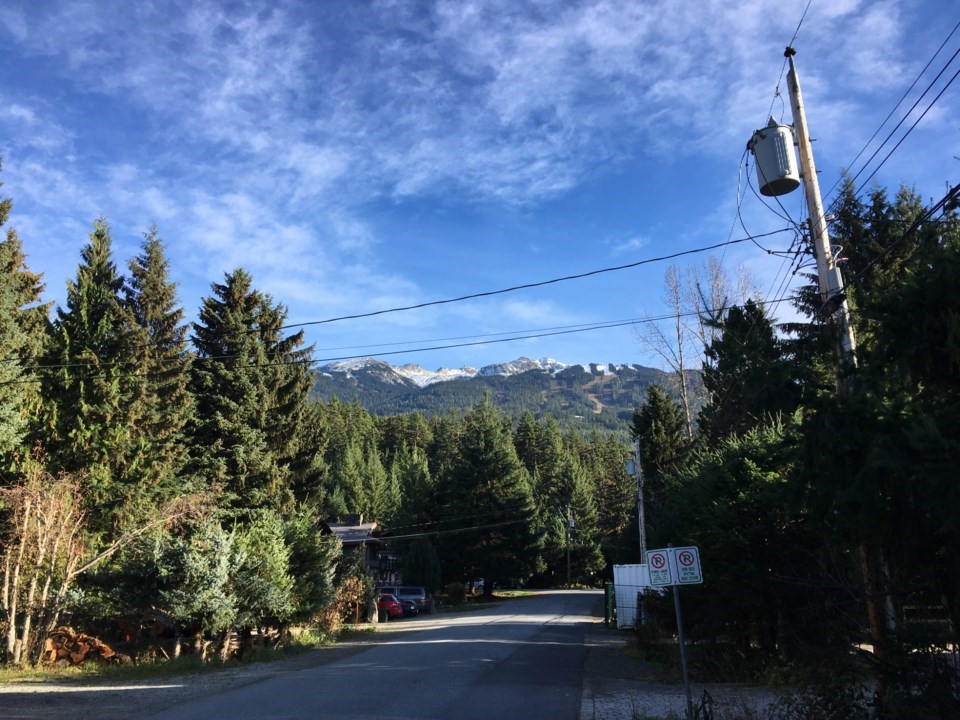Homeowners in White Gold have another chance to vote on a costly, resident-led project to bury utility lines that some say has divided the neighbourhood—unless Whistler council decides to axe it altogether.
The project—which originally passed on Nov. 3, 2020 (with Councillor Jen Ford opposed) before being brought back for reconsideration by Coun. Cathy Jewett two weeks later—has proved controversial in the neighbourhood, pitting neighbours against each other in the otherwise placid suburb.
“It’s really fractured the neighbourhood because it seems to be long-term locals who don’t have a lot of money versus people from out of town,” said 21-year White Gold owner Ian Reith, who has been opposed to the project since its inception.
“Now some neighbours won’t talk to other neighbours over this; some get heated—I get heated about it sometimes.”
On Sept. 5, 2019, council received a letter from Toni Metcalf, speaking as a resident of the neighbourhood (Metcalf is also the Resort Municipality of Whistler’s [RMOW] economic development coordinator—she has recused herself from discussing the project at past council meetings) expressing the interest of White Gold residents to initiate a formal petition process for the work.
Though the project was initiated by residents, some have since argued the process—which required 50 per cent support representing 50 per cent of the total property value—was not fully transparent about the costs to some homeowners. Ultimately, of 160 total affected properties, 93 voted in favour of the project, or 58 per cent.
As of December 2020, the total estimated cost for homeowners was pegged at $4,675,000, which could be covered by each affected resident with a lump sum payment of $38,751, or 30 annual parcel tax payments of between $1,130 and $1,230, depending on the property and the complexity of the work required.
That estimate has since ballooned by nearly $3 million, for a total projected cost to homeowners of $7,488,118, representing a lump sum payment of $46,801 per resident, or 30 annual parcel tax payments of $2,438, which is what triggered a second vote in the neighbourhood.
In an interview last week, however, RMOW officials were clear that there remains some cost analysis to be done that could still bring the price tag down closer to its original level.
“We’re 80 to 95 per cent through the designs and cost estimates from BC Hydro, Telus and Shaw, but we still need one last cost estimate around the civil infrastructure piece and that may actually drop the total project cost,” explained Ginny Cullen, chief administrative officer for the RMOW. If the estimated cost is over the original petition value, the project will go back to council, which will decide on whether to re-petition residents.
Owners can choose to defer their tax payments, although of course that only puts off the inevitable financial burden to a later time.
“You can’t refinance your house without paying that back,” Reith noted. “It’s still going to come out of my pocket eventually, whether I sell in five, 10, 20 or 30 years, for something I don’t want, don’t need and won’t make any difference.”
That also doesn’t take into account any additional costs required for homeowners to bury the power lines on their own property. The estimate Reith got for that work, which would require the line to be buried under his deck and into his backyard, was about $9,500. Owners do have a cheaper option that will allow them to install a pole on their property to run a power line above ground to their home, estimated to cost up to $5,000.
Fortunately for frustrated owners like Reith, there is another lifeline in play. In spite of the successful petition, Whistler council has the authority to reject the project. There was initially some confusion as to whether council had the power to turn down a resident-initiated process, and the legal precedent it might set. But after local officials consulted with B.C.’s then-Minister of Municipal Affairs Josie Osborne* at last fall’s Union of B.C. Municipalities Convention, the confusion was cleared up.
“We will go back to residents to update them and hold another open house and then we would bring it to council for final review,” Cullen added.
Both Ford and Jewett have expressed their opposition to a project that would potentially foist thousands of dollars onto owners who weren’t in favour of the project to begin with.
“I feel I made a mistake on Nov. 3 by not opposing it … People are hurting in this town, and these are some of the people that are hurting,” Jewett said at a council meeting in December 2020, in reconsidering her original vote in favour.
“So this doesn’t pass, for me, the smell test, particularly during COVID, and the fact that people can’t afford an extra [cost].”
Find more info and follow the project at whistler.ca/whitegoldutilities.
*An earlier version of this article incorrectly stated that Whistler officials met with current Minister of Municipal Affairs Selina Robinson at last year's UBCM Convention. In fact, it was Minister Josie Osborne, the former mayor of Tofino, who served in the role at the time.




